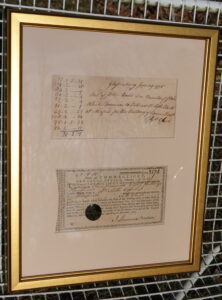Jan 1, 2023
After the news of the Battles of Lexington and Concord reached Connecticut, and after the British had retreated back into Boston, a patriotic wave of enthusiasm swept over thousands of Connecticut minutemen, inspiring them to go and support their fellow patriots in Massachusetts.
With the British penned inside Boston, a siege of that occupied town took place with minutemen from throughout New England surrounding Boston.
With knapsacks on their backs and muskets on their shoulders, the Connecticut companies departed and marched towards Massachusetts. Those marching from the Connecticut towns located along the Middle Post Road included militiamen from the towns of Putnam, Woodstock, Pomfret, Ashford, Mansfield, Coventry, Bolton and East Hartford. Many were under the leadership of Captain Israel Putnam as they marched towards Boston passing into Massachusetts and through the towns of Mendon, Milford and Medway before coming to Medfield.
Meanwhile, the owner of what used to be the Clark Tavern on Main Street, located next to the Peak House, Seth Clark, went out of his way to welcome the militia troops marching through the town.
Clark, an ardent patriot, had served as a delegate to the Provincial Congress in 1775, and he would go on to play a major role during the war as Assistant Commissary in the American army. Clark welcomed the Connecticut patriots to stop, eat, drink, and stay at his tavern.

At a later date, another Connecticut soldier sent by General Washington, Nathan Hale, would make his way along that same Middle Post Road. He would pass through Medfield staying at the Clark Tavern, travel onto his home in Coventry and into New York, where he would be captured by the British, held as a spy, and executed on September 22, 1776. The immortal words credited to him, “I only regret that I have but one life to lose for my country.” are etched into our history.
Through the generosity of a former long-time Medfield resident, John Gagliani, who contributed greatly to Medfield as a member of the Planning Board and as one who helped save the Dwight-Derby House, two very special documents that highlight Medfield’s role during the Revolutionary War have been donated to the Medfield Historical Society.
Mr. Gagliani purchased the 7 ½ inch by 3 ½ inch “bills” that members of the Connecticut militia incurred while staying at the former Clark Tavern. It includes a “supply document” stating that the Clarks were “to receive some ten barrels of flour” from the then “Colony of Connecticut.” We can speculate that this was done as payment.
Also printed next to that is what appears to be a variety of expenses listed in pounds, shillings, and pence. It is fascinating to note that, though there had been three bloody battles in less than two months, Americans still referred to themselves as colonists, as the document shows” for the Colony of Connecticut.”
It is also interesting to see that the bill/receipt is dated June 29, 1775, some 12 days after the Battle of Bunker Hill, which many of those same Connecticut minutemen fought in. The 11-month “Siege of Boston” would continue until March 17, 1776, known to this day in Boston as British “Evacuation Day,” even though it is generally overshadowed by St. Patrick’s Day.
For more about the siege, click here.
The second document Mr. Gagliani has donated is a promissory note from the “State of Connecticut,” to Seth Clark, dated February 1, 1781, towards the end of the war. It promised to “pay Seth Clark two pounds, eight shillings, ten pence,” which we can again speculate was in payment for a bill he submitted to Connecticut for perhaps food and drink while the troops were staying at the tavern, while guarding the Middle Post Road. The promissory note was to be paid in “Spanish Milled Dollars or other gold or silver coins,” and paid “after the end of the current hostilities between Great Britain and these United States.” It appears the bill was actually paid in February, 1785. Both of the almost 250-year-old documents are in good condition.
While the historic Clark Tavern may be gone, it is a significant donation Mr. Gagliani has made that will keep alive a visual piece of Medfield’s Revolutionary War history.